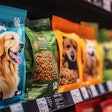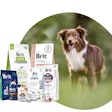
“Plant-based” food used to be the designated lane of vegetarians and vegans, but now the trend has expanded and so-called “flexitarians” are stepping in to try it out.
According to Innova Market Insights data presented during “Innovating for the future of plant-based pet food,” a February 2021 WATT Global Media webinar hosted by Petfood Industry, even the term “plant-based” is evolving in meaning, with one in three (32%) global consumers considering a plant-based diet to be “meat and dairy reduced,” rather than “strictly vegan” (17%) or “strictly vegetarian” (24%). Brands are catching on, according to Innova data, with food and beverage launches that have plant-based claims seeing 47% annual growth globally (CAGR, 2016–November 2020).
Of course, now that plant-based products are having their shining moment in the human food space among a wider audience than ever, the trend is growing significantly in the pet food space. According to Innova data, “vegan” claims on new pet food products saw a 30% CAGR from 2016–November 2020, and “plant-based” claims saw 40% growth in the same time frame.
Why is plant-based trending right now in pet food?
There are many factors at play in terms of the plant-based trend and its place in pet food, including shifting consumer perspectives, an increased focus on sustainability with regards to pet food ingredients, pet health and wellness, and of course the various effects COVID-19 has had on consumer psyches and business trends alike.
“There’s a lot of buzz around veganism for humans,” said Lindsay Rubin, vice president of v-dog, a vegan dog food company that has been focused on the segment since its founding in 2005. “I think a lot of people are questioning it, considering it, trying to understand it, and there really are more delicious options than ever. And there’s more focus (on the trend) at a time when the pandemic is really driving a lot of uncertainty, especially in supply chains and the production of animals used for meat, whether it's shortages or people changing their lifestyles and considering what they’re eating more. All of that is culminating together in the human world, and we know that human trends seep over to pet food trends.”
The inevitability of human food trends encroaching into the pet food space is well documented, and plant-based seems to be no exception.
“From our study published in PLOS One (a peer-reviewed open access scientific journal published by the Public Library of Science) a couple years ago, it looks like the plant-based pet feeding trend is much like the human practice — we see a larger proportion of pets that are fed plant-based as a component of their diet and a small proportion fed a plant-based diet exclusively,” said Dr. Sarah Dodd, BVSc, MSc, a Ph.D. candidate and ECVCN resident in the Departments of Clinical Studies and Population Medicine at the University of Guelph in Ontario, Canada. “New diets and products keep popping up, again, seeming like a small version of the explosion of plant-based human food products. I predict that as long as the trend is growing in the human world, we'll likely see a similar growth occurring in the pet food industry.”
Two main factors: sustainability and pet health
Sustainability is a significant trend in almost every segment of consumer goods right now, and it is quite prevalent in the food space. For protein sources, this means addressing the potential limitations of animal proteins and the concern of fighting for resources between the human and pet food worlds.
That concern was one of the driving forces behind the founding of Petaluma, a sustainable pet nutrition company that just launched its first product, a baked, plant-based dog food.
“Our goal is to use more sustainable protein sources and have dog food that addresses some of the environmental and animal welfare burdens that some of the traditional animal-based proteins are experiencing,” said company Founder Garrett Wymore.
According to Wymore, the expansion of pet humanization led him to wonder about some of the sustainability challenges to the market. “Feeding more of the human-grade, premium meat sources — were we basically going to import some of the same issues that exist in human diets?” he said. “I think one of the reasons we were really interested in plant-based are the broader implications in sustainable agriculture. The role that you can change demand and what we grow based on how we feed our pets. Companion animals are a meaningful portion of total consumption in the United States and increasingly around the world, and we’re already producing a lot of different plant proteins that provide an immediately commercially feasible option that people are much more familiar with.”
Pet health and wellness has always been a focus for pet owners, but the pandemic, which caused everyone to take a hard look at their own health, has brought it even further under the consumer microscope.
“As more consumers make the connection between a good diet and improved health for themselves, they are now taking extra care to choose the right foods for their beloved pets to help increase their overall well-being and health, especially for pets with specific health conditions,” said Karel Thurman, commercial director for Beneo Animal Nutrition, a Germany-based company that provides naturally sourced feed ingredients. “One clear consumer trend that crosses over to the pet food category is the increasing demand for added protein. ‘Added protein’ is a claim that makes pet food seem healthier to four in five pet owners (according to company consumer research).”
In a recent Beneo study surveying pet parents in the U.S., 72% of respondents claimed that they were open to having plant-based protein sources in their pet’s diet. The respondents indicated a high interest in hybrid diets with a good balance between animal and plant-based protein sources, lending further credence to the idea that the concept of flexitarianism, which in the human space encompasses the “meatless Monday” or occasional vegetarian/vegan lifestyle trends, is increasingly leading pet owners to try similar ways of feeding their pets.
The future of plant-based pet food
Whether the plant-based pet food trend continues to boom or settles in for a more sedate long haul remains to be seen. What everyone does seem to agree on is that it is definitely a segment worth watching.
“I see the category expanding,” said Rubin. “I see the category validated by more competition and more brands. I see e-commerce and pet continuing to explode, especially for plant-based products. The demographics that are buying plant-based products are highly millennial and are already buying products online. The future is vegan, it’s online and it’s more options in the plant-based space for pets.”
That’s not to say there won’t be challenges along the way.
“I would expect the biggest challenges to be regarding limitations on ingredients,” said Dodd. “Clearly, formulating a plant-based diet means excluding all animal-derived ingredients, which takes out the majority of conventional protein-rich ingredients. In North America in particular, where ingredient use is defined and limited by AAFCO (the Association of American Feed Control Officials), that leaves very few options with which to formulate a diet that meets the nutritional requirements of the animal to which it is intended to be fed. There have been many new and exciting plant-based ingredients that have been investigated recently, but as of yet many of these are not approved for use in pet foods.”
Still, it seems likely that the challenges are worth the effort. According to Innova’s Nutrition & Health Survey 2020, 31% of people said their consumption of plant-based protein had increased in the last 12 months. Further, the top reasons encouraging consumers to switch to plant-based protein are health, diet variety, sustainability and taste — all things pet owners are increasingly demanding for their animals, as well.



















